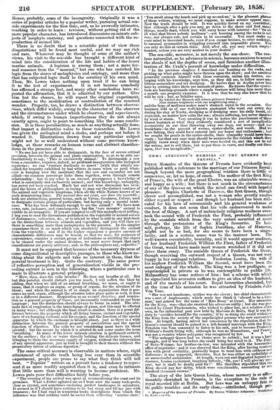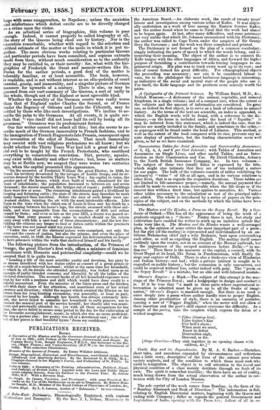EMMA ATKINSON'S MEMOIRS OF THE QUEENS OF PRUSSIA. * THESE Memoirs
of the Queens of Prussia have evidently been published with a reference to the marriage of our Princess Royal ; though beyond the mere geographical relation there is little of connexion, or, let us hope, of omen. The mother of the first King of Prussia, the wife of the great Elector, was an admirable woman and happy as a wife ; but there is not much in the circumstances of any of the Queens on which the mind can dwell with hopeful pleasure. Sophia Charlotte of Hanover, the first Queen, though clever and accomplished, was not a woman who greatly excites either regard or respect ; and though her husband has been ridi- culed for his love of ceremonials and his general weakness of conduct, it does not seem that his wife endeavoured to make the best of things. A sort of melancholy religious madness over- took the second wife of Frederick the First, probably influenced .Aby the mambas which from the very outset occurred at mat 'through the pretensions of the King's favourite. To her- self, perhaps, the life of Sophia Dorothea, also of Hanover, might not i3e so bad, for she seems to have been a singu- larity, and in a certain sense was to the manner born. The well-known eccentricity, brutality, and it would appear madness, of her husband Frederick William the First, father of Frederick the Great, would have made most women wretched if it did not drive them crazy. The amiable Queen of Frederick the Great, though receiving. the outward respect of a Queen, was not very happy in her conjugal relations. Frederica Louisa, the wife of his nephew Frederick William the Second, must have been the most unhappy of the whole. The King was a low profligate, as
i unprincipled in private as he was contemptible in public life. Malmesbury has some notices of him ; but a scheme with which he signalized his accession suffices to give an idea of the husband, and of the morals of his court. Royal favourites abounded, but at the time of his accession he was attracted by Fraulein Julie Von Voss.
" She was not handsome, neither was she clever ; her chief characteristic was a sort of Anglomania, which made her think it ' absurd to be a Ger- man,' and gained her the name of Miss Bessy ' at Court. Her attraction for the King, was—that.she received his advances coldly ; but she was per- suaded by Count Finckenstein, who wished to place her, as a relative of his own, in the influential post now held by Madame de Reitz, that it was her duty to sacrifice herself for the country, if by so doing she could withdrew the Bing from the society of the unprincipled persons who now surrounded him. At length, having salved her conscience by the stipulation that the Queen's consent should be gained to a left-handed marriage with the Ring, Fraulein von Voss consented to listen to his suit, and to become Frederick William's fourth living wife, although he was no Mussnlman, and Prussia was not a country where polygamy was recognized by law. • e •
"The unhappy Queen had no choice save to submit ; but it was a hard struggle, and it was long before she could bring her mind to it. The Duke of Saxe-Weimar. her brother-in-law, was intrusted with the honourable office of negotiator ; and it was observed that the King, after having received him with great cordiality, gradually began to treat him with coldness and disfavour; it was supposed, therefore, that he was either an unfaithful or an unsuccessful ambassador. At length, worn out and disgusted beyond en- durance, Louisa exclaimed, laughing bitterly, Oh, yes ! I will give my con- sent, but it shall be dearly paid for I ' She therefore stipulated that the King should pay her debts, which were considerable, amounting to one hundred thousand crowns."
The story of the late Queen Louisa, whose memory is so affec- tionately cherished in Prussia, is the exception to the rule of royal married life at Berlin. But hers was an unhappy fate in its public troubles and its early close,—attributed, though per- • AreliWiP4 of the Queens of Prussia. By Emma Willsher Atkinson. Publisbee by Kent rod Co, haps with some exaggeration to Napoleon ; unless the anxieties and misfortunes which defeat excite are to be directly charged as a crime upon the victor. As an artistieal series of biographies, this volume is poor enough. Indeed, it cannot properly be called biography at all, the story of the Queens being eked out by history. Nor is the execution remarkable, whether with regard to the selection and critical estimate of the matter or the mode in which it is put to- gether. The more obvious works relating to particular Queens and particular periods have been consulted, and copious extracts made from them? without much consideration as to the authority they may be entitled to, or their novelty: for, what with the bio- graphies of Frederick the Great and memoir-writers like Dr. Doran for the earlier periods, a good deal of the matter is tolerably familiar, or at least accessible. The book, however, is readable, and is not without interest as an olla-podrirla of court scandal, gossip, and immorality, and a singular picture of German manners for upwards of a century. There is also, as may be guessed from our curt summary of the Queens, a sort of unity in the whole, though not of the highest or most agreeable kind. Whether the morality of the German courts was really worse than that of England under Charles the Second, or of France under the Regency of Orleans and Louis the Fifteenth, may be settled by those who like such investigations. We incline to as- scribe the palm to the Germans. At all events, it is quite cer- tain that f0 vice itself did not loose half its evil by losing all its grossness." Grossness was its predominant feature. Our fair writer cannot but admit all this ; but she seems to as- scribe much of the German immorality to French fashions, and to the immigration of French Huguenots into Prussia, consequent upon the revocation of the edict of Nantes. That much immorality may coexist with vast religious pretensions we all know ; but we doubt whether the Thirty Years War had left a great deal of so- cial evil to be taught by the French Protestants, who sacrificed everything to conscientious conviction. Dirt, poverty, squalor, may exist with chastity and other virtues ; but, loose as matters may be at Berlin now, we suspect they were worse two centuries ago, when the capital presented this appearance. " On the accession of Frederick William the great Elector, in 1640, he found his territory devastated by the ravages of hostile troops, and its re- sources drained by the terrible Thirty Years War ; his capital in ruins, the greater part of the houses, which were built of wood, abandoned for the want of inhabitants ; the population decreased to between six and seven thousand ; the streets unpaved,the bridges out of repair ; public buildings there were few or none. The remaining inhabitants gained a livelihood by keeping and fattening cattle - the state of the streets may therefore be more easily imagined than described. Before the door of each house were un- deaused stables, tainting the air with the most intolerable effluvia. Like Paris in the time when the eldest son of Louis le Gros met his death by .a pig's running between his horse's legs, the streets swarmed with these ani- mals, and were impassable from the accumulations of filth and refuse caused by them ; and even so late as the year 1671, a decree was passed or- daining that every peasant who came to market should on his return carry away with him a cart-load of these abominations ; and the law for- bidding the citizens any longer to feed or fatten cattle within the precincts of the town was not passed until ten years later.
"Under the roof of the electoral palace were comprised, not only the mint and the courts of justice, but also the prisons, and even the place of execution, until, in 1648, the Elector expressed his determination no longer to have prisoners within the walls that sheltered himself and his family."
The following picture from the introduction, of the Prinoess of Orange, the Feat Elector's first wife, offers a mixture of feminine excellence with. Homeric and patriarchal simplicity—could we be assured that it is quite true.
"Leading a life of the most saintlike purity and devotion, her piety by no means interfered with her duties either as consort of a great prince or as wife of a much-beloved husband ; whilst at the same time her household, to which in all its details she attended personally, was looked upon as an example of justly-blended economy and liberality by all the ladies of the electoral dominions. The account-books of all her household expenses were kept by her with a neatness and skill which would have done credit to a regular accountant. Even the minutiae of the linen-press and the kitchen met with their share of her attention, and sometimes even of her actual presence and direction ; whilst the supper which awaited the Elector on his return from his long hunting excursions, was generally, at least in part, prepared by her hands. Although her health was always extremely deli- cate, she never failed to assemble her household to early prayers, nor to conduct the musical part of the service herself; her charity also was muni- ieent and punctually attended to ; yet with all these occupations for her time, she never failed to secure some period in the day for the cultivation of her favourite accomplishment, music, in which she was no mean proficient. She was a poetess also : her poetry was all of a devotional cast ; one of the best of her pieces is that beautiful hymn Jesus my confidence.' "



































 Previous page
Previous page